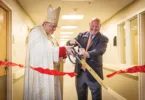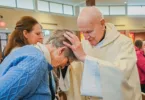by Joe Bollig
joe.bollig@theleaven.org
KANSAS CITY, Kan. — Americans have a lot of things that Ethiopians do not have — a really great infrastructure being just one of them.
But as archdiocesan seminarian Daniel Stover discovered, Ethiopians are rich in ways that Americans find themselves paupers: a sense of the presence of God.
“They are very aware of the presence of God in their lives and the world,” said Stover, who recently visited Ethiopia.
“They do not have that separation that we experience in the West,” he continued. “Spirituality is a reality [to them]. It is not something intangible that cannot be grasped. It is much more tied to their concrete realities.”
Stover, a member of Most Pure Heart of Mary Parish in Topeka, visited Ethiopia from Feb. 18-26 as part of his studies at the University of St. Mary of the Lake, Mundelein Seminary, in Illinois.
During their studies, seminarians are required to go on a mission trip as part of the seminary’s social justice curriculum. Some seminarians chose a Native American reservation near Tucson, Ariz. Stover chose Ethiopia.
Through its Global Resource Fellows program, CRS sponsors water resource programs in Ethiopia. Stover, seven other seminarians and their dean of formation were briefed at CRS headquarters in Baltimore, then departed for Ethiopia.
Their first stop was the Missionaries of Charity facility in the capital, Addis Ababa. There, in a very poor neighborhood filled with clapboard shacks and dirt streets, the Sisters take care of 1,000 people a day.
“They have a tuberculosis ward,” said Stover. “[Patients] have to take medication for four months, and they can’t miss a day. They have to stay there, where they have food and a place to sleep.” The Sisters also take care of mentally and physically handicapped children, the terminally ill, orphans, and unwed mothers.
“Some come when they are in labor,” said Stover. “The Sisters have even delivered babies on the sidewalk.”
There is nothing uplifting or charming about poverty or sickness, but the Sisters — who are from all over the world — serve the poor with joy.
“The Sisters were very happy,” he said. “When they serve the least of humanity, they serve Christ. To them, these people are in Christ’s image and likeness. This gives them strength, and they draw a lot of energy from serving Christ.”
Even the best efforts of the Sisters cannot reach all the suffering of the slum. In an alley beside the Sisters’ facility, Stover found a teenage boy lying on the ground with a bottle. He asked one of the Sisters about it. She said some find their lives of poverty so oppressive that they spend what little they have on a bit of glue to sniff to get high.
The major part of the group’s time was spent outside of Addis Ababa, visiting watershed projects operated by CRS. Most of the program heads are Ethiopians, in keeping with the CRS policy of empowering Ethiopians. Their first stop was the city of Mekelle.
“We flew there, because Ethiopia’s infrastructure is so poor,” said Stover. “It wasn’t more than a two-hour flight. It would have been a 16-hour drive.”
Ethiopia is a dry and mountainous country, a lot like Arizona. Vast parts of the country have never recovered from the drought and resulting famine during the mid-1980s. Without managing the water resources, the farmers would not be able to grow enough food to sustain Ethiopian society.
“It was amazing how little it took to help these people,” said Stover. “One of the people we talked to at the watershed projects was a farmer. Completely by chance, we got to meet the man who is on the insert that came with the Operation Rice Bowl [collection boxes], Ato Teklu.”
“He said just because of the water project, he is able to produce enough food to feed his family and send his children to school,” Stover continued. “These are things he could not have done prior to [the watershed project].”
The group learned not only about the physical, but also the religious, landscape of the country. About 50 percent of Ethiopians are Orthodox, 40 percent Muslim, and 10 percent “other.” About one percent of the “other” is Catholic. By and large, there is no religious conflict. Among the Protestant churches, the Mennonites have a growing presence.
Catholics are mostly known through agencies like CRS and Caritas Internationalis and their efforts in emergency relief, development, health care and education.
“Catholics are very well-respected,” said Stover. “Several government officials were educated by the Jesuits and Christian Brothers.”
Later, in the city of Adigrat, the seminarians met Eparch Abune Tesfaselassie, the Catholic bishop of the Ethiopian rite. There are more Catholics in this northern city than in any other place in the country.
“He told us about the situation in his eparchy (diocese),” said Stover. “He was very warm and kind. He has a real concern for the people of his diocese.”
Stover learned about Ethiopia on his trip, but he also gained a better appreciation of the poor.
“This gave me a sense of solidarity,” said Stover. “It gave me a sense of the individual persons being affected. It’s not just a shapeless mass of poor people in another country.”
“You hear about a group of people and you think you might know all about them, but until you meet them, it’s not real,” he said. “[This trip] made it so real. It gave me a real concern for these people that I should be praying for and supporting financially, if I’m able.
“And it made me aware of how much we have in this country and how privileged we are, for no other reason than for where we were born.”






